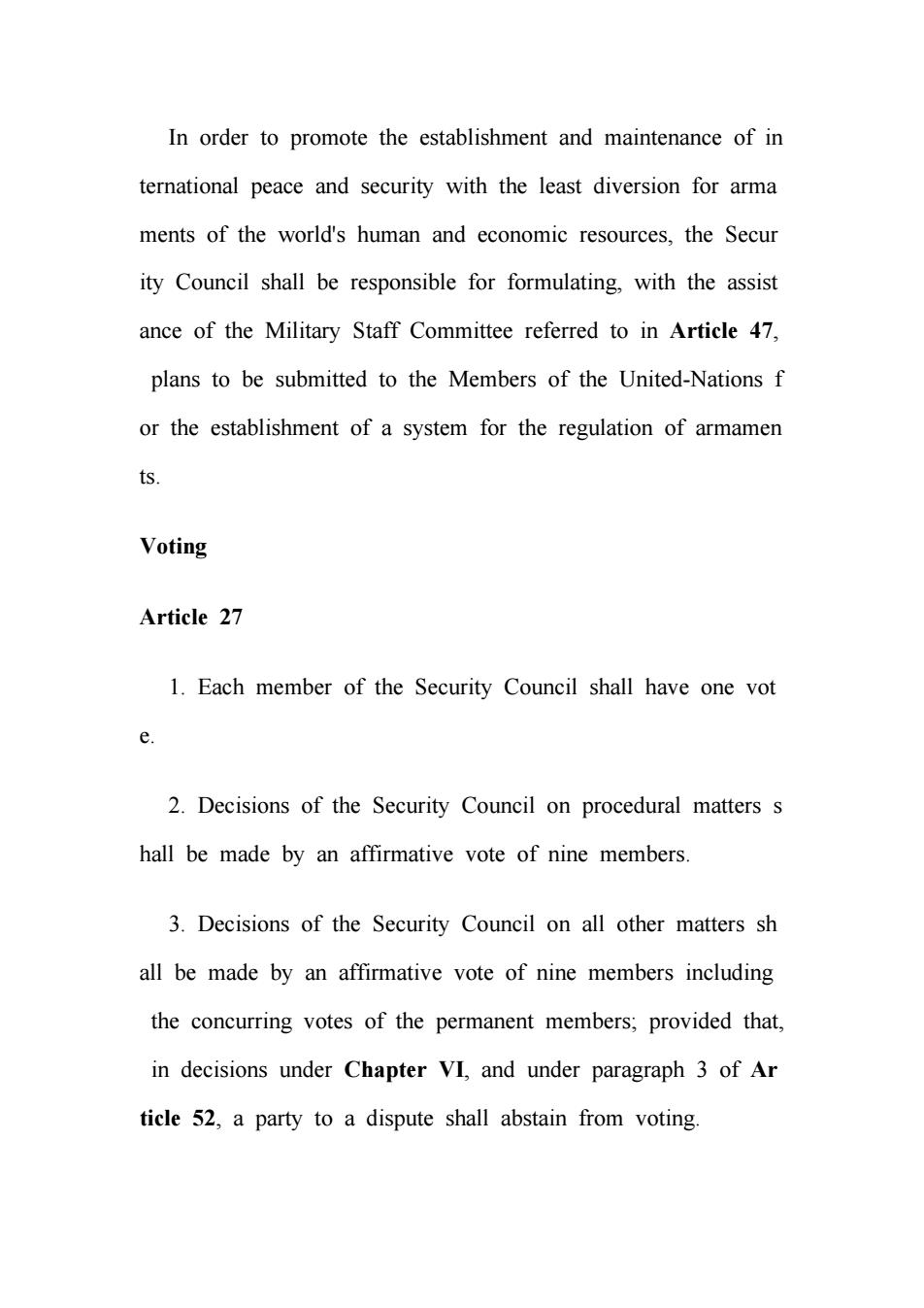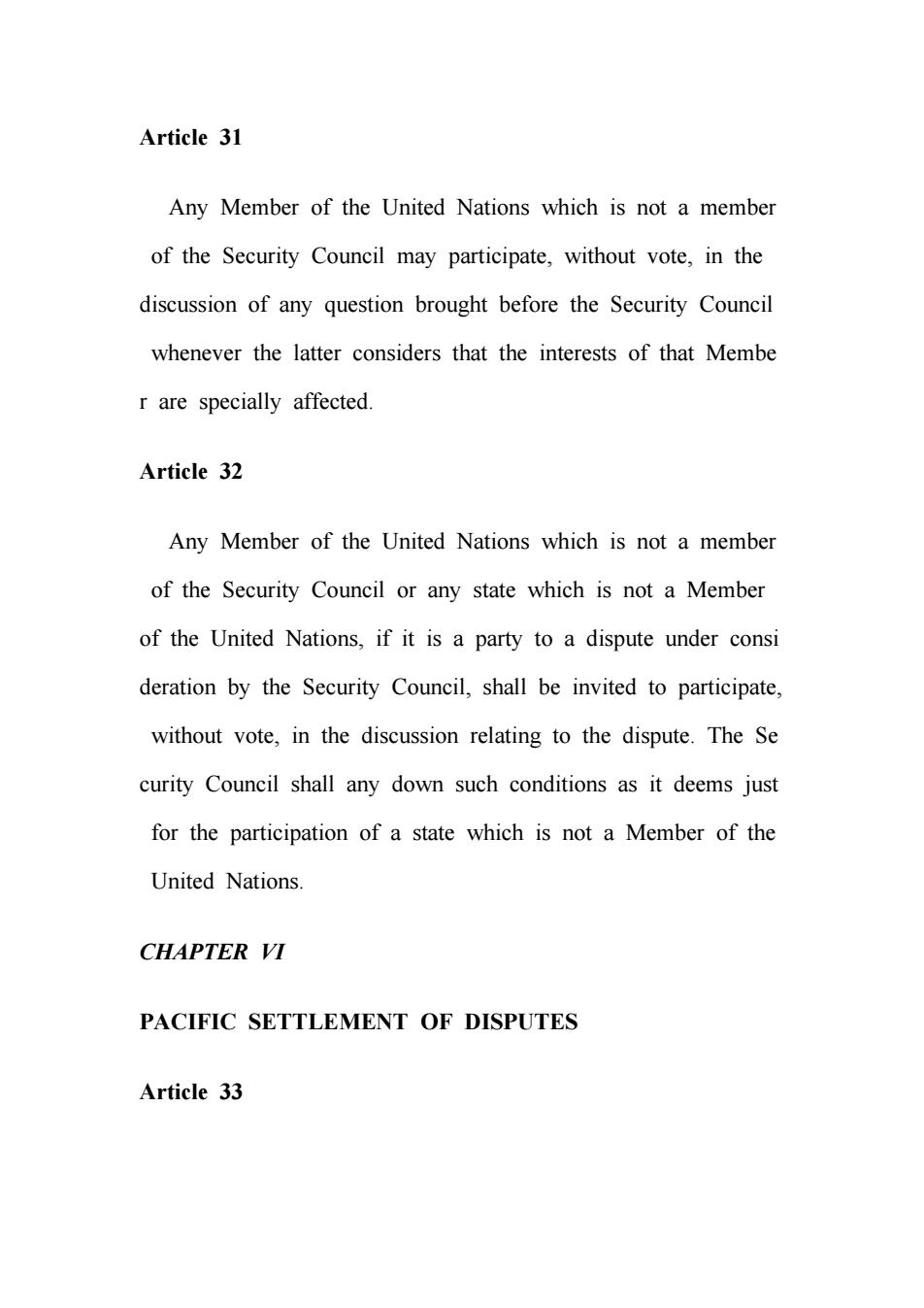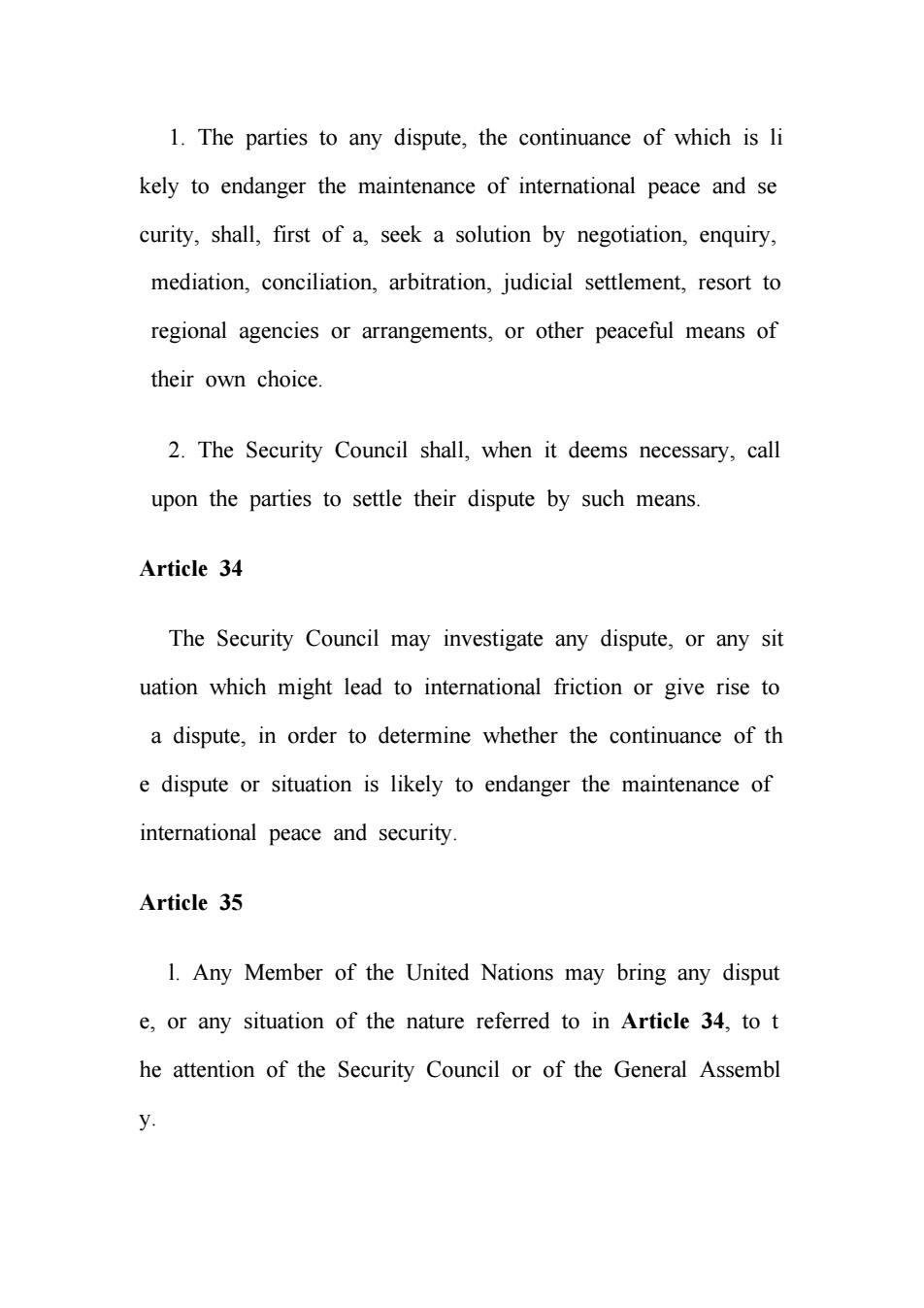
Article 24 1.In order to ensure prompt and effective action by the Un ited Nations,its Members confer on the Security Council prim ary responsibility for the maintenance of international peace an d security,and agree that in carrying out its duties under this responsibility the Security Council acts on their behalf. 2.In discharging these duties the Security Council shall act in accordance with the Purposes and Principles of the United Nations.The specific powers granted to the Security Council f or the discharge of these duties are laid down in Chapters VI, VII,VIII,and XII. 3.The Security Council shall submit annual and,when nece ssary,special reports to the General Assembly for its considera tion. Article 25 The Members of the United Nations agree to accept and car ry out the decisions of the Security Council in accordance with the present Charter. Article 26
Article 24 1. In order to ensure prompt and effective action by the Un ited Nations, its Members confer on the Security Council prim ary responsibility for the maintenance of international peace an d security, and agree that in carrying out its duties under this responsibility the Security Council acts on their behalf. 2. In discharging these duties the Security Council shall act in accordance with the Purposes and Principles of the United Nations. The specific powers granted to the Security Council f or the discharge of these duties are laid down in Chapters VI, VII, VIII, and XII. 3. The Security Council shall submit annual and, when nece ssary, special reports to the General Assembly for its considera tion. Article 25 The Members of the United Nations agree to accept and car ry out the decisions of the Security Council in accordance with the present Charter. Article 26

In order to promote the establishment and maintenance of in ternational peace and security with the least diversion for arma ments of the world's human and economic resources,the Secur ity Council shall be responsible for formulating,with the assist ance of the Military Staff Committee referred to in Article 47, plans to be submitted to the Members of the United-Nations f or the establishment of a system for the regulation of armamen ts. Voting Article 27 1.Each member of the Security Council shall have one vot e. 2.Decisions of the Security Council on procedural matters s hall be made by an affirmative vote of nine members. 3.Decisions of the Security Council on all other matters sh all be made by an affirmative vote of nine members including the concurring votes of the permanent members;provided that, in decisions under Chapter VI,and under paragraph 3 of Ar ticle 52,a party to a dispute shall abstain from voting
In order to promote the establishment and maintenance of in ternational peace and security with the least diversion for arma ments of the world's human and economic resources, the Secur ity Council shall be responsible for formulating, with the assist ance of the Military Staff Committee referred to in Article 47, plans to be submitted to the Members of the United-Nations f or the establishment of a system for the regulation of armamen ts. Voting Article 27 1. Each member of the Security Council shall have one vot e. 2. Decisions of the Security Council on procedural matters s hall be made by an affirmative vote of nine members. 3. Decisions of the Security Council on all other matters sh all be made by an affirmative vote of nine members including the concurring votes of the permanent members; provided that, in decisions under Chapter VI, and under paragraph 3 of Ar ticle 52, a party to a dispute shall abstain from voting

Procedure Article 28 1.The Security Council shall be so organized as to be able to function continuously.Each member of the Security Counci I shall for this purpose be represented at times at the seat of t he Organization. 2.The Security Council shall hold meetings at which each of its members may,if it so desires,be represented by a mem ber of the government or by some other specially designated r epresentative. 3.The Security Council may hold meetings at such places other than the seat of the Organization as in its judgment will best facilitate its work. Article 29 The Security Council may establish such subsidiary organs a s it deems necessary for the performance of its functions. Article 30 The Security Council shall adopt its own rules of procedure, including the method of selecting its President
Procedure Article 28 1. The Security Council shall be so organized as to be able to function continuously. Each member of the Security Counci l shall for this purpose be represented at times at the seat of t he Organization. 2. The Security Council shall hold meetings at which each of its members may, if it so desires, be represented by a mem ber of the government or by some other specially designated r epresentative. 3. The Security Council may hold meetings at such places other than the seat of the Organization as in its judgment will best facilitate its work. Article 29 The Security Council may establish such subsidiary organs a s it deems necessary for the performance of its functions. Article 30 The Security Council shall adopt its own rules of procedure, including the method of selecting its President

Article 31 Any Member of the United Nations which is not a member of the Security Council may participate,without vote,in the discussion of any question brought before the Security Council whenever the latter considers that the interests of that Membe r are specially affected. Article 32 Any Member of the United Nations which is not a member of the Security Council or any state which is not a Member of the United Nations,if it is a party to a dispute under consi deration by the Security Council,shall be invited to participate, without vote,in the discussion relating to the dispute.The Se curity Council shall any down such conditions as it deems just for the participation of a state which is not a Member of the United Nations. CHAPTER VI PACIFIC SETTLEMENT OF DISPUTES Article 33
Article 31 Any Member of the United Nations which is not a member of the Security Council may participate, without vote, in the discussion of any question brought before the Security Council whenever the latter considers that the interests of that Membe r are specially affected. Article 32 Any Member of the United Nations which is not a member of the Security Council or any state which is not a Member of the United Nations, if it is a party to a dispute under consi deration by the Security Council, shall be invited to participate, without vote, in the discussion relating to the dispute. The Se curity Council shall any down such conditions as it deems just for the participation of a state which is not a Member of the United Nations. CHAPTER VI PACIFIC SETTLEMENT OF DISPUTES Article 33

1.The parties to any dispute,the continuance of which is li kely to endanger the maintenance of international peace and se curity,shall,first of a,seek a solution by negotiation,enquiry, mediation,conciliation,arbitration,judicial settlement,resort to regional agencies or arrangements,or other peaceful means of their own choice. 2.The Security Council shall,when it deems necessary,call upon the parties to settle their dispute by such means. Article 34 The Security Council may investigate any dispute,or any sit uation which might lead to international friction or give rise to a dispute,in order to determine whether the continuance of th e dispute or situation is likely to endanger the maintenance of international peace and security. Article 35 1.Any Member of the United Nations may bring any disput e,or any situation of the nature referred to in Article 34,to t he attention of the Security Council or of the General Assembl y
1. The parties to any dispute, the continuance of which is li kely to endanger the maintenance of international peace and se curity, shall, first of a, seek a solution by negotiation, enquiry, mediation, conciliation, arbitration, judicial settlement, resort to regional agencies or arrangements, or other peaceful means of their own choice. 2. The Security Council shall, when it deems necessary, call upon the parties to settle their dispute by such means. Article 34 The Security Council may investigate any dispute, or any sit uation which might lead to international friction or give rise to a dispute, in order to determine whether the continuance of th e dispute or situation is likely to endanger the maintenance of international peace and security. Article 35 l. Any Member of the United Nations may bring any disput e, or any situation of the nature referred to in Article 34, to t he attention of the Security Council or of the General Assembl y